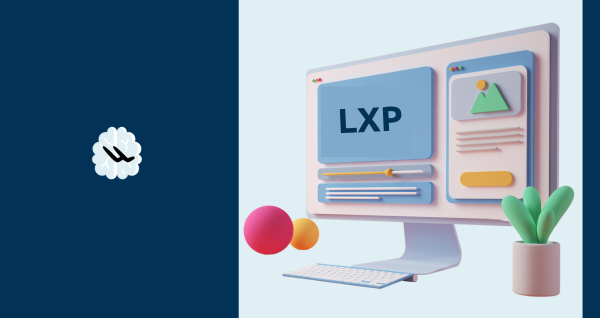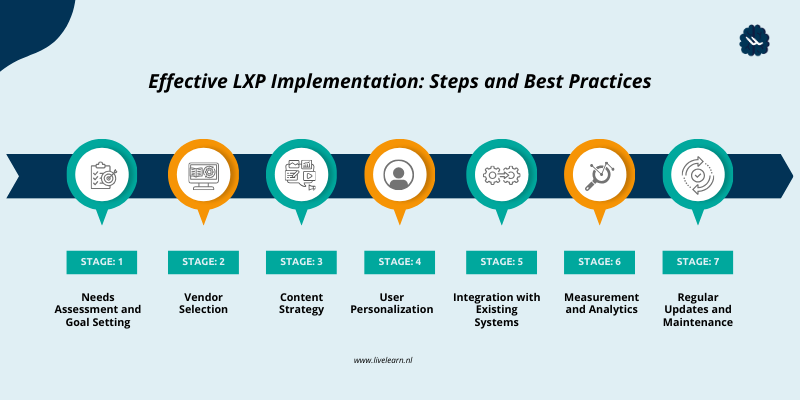
Artikel
19
oktober
Effective LXP Implementation: Steps and Best Practices
Implementing a Learning Experience Platform (LXP) effectively is crucial for organizations looking to enhance employee learning and development. LXPs are designed to provide a personalized, engaging, and efficient learning experience. Here are steps and best practices for an effective LXP implementation:
1. Needs Assessment and Goal Setting:
Identify your organization’s learning and development needs. Set clear goals and objectives for the LXP implementation. Define key performance indicators (KPIs) to measure success.
2. Stakeholder Involvement:
Involve key stakeholders, including HR, IT, training managers, and end-users, in the planning process.
Gather input and feedback to ensure the LXP aligns with their requirements.
3. Vendor Selection:
Research and choose an LXP vendor as LiveLearn that aligns with your organization’s needs and budget.
Evaluate the platform’s features, scalability, support, and user-friendliness.

4. Content Strategy:
Develop a content strategy that includes curating and creating relevant, high-quality learning materials.
Consider different content types, such as videos, eLearning modules, articles, and microlearning.
5. User Personalization:
Leverage the LXP’s personalization capabilities to provide a tailored learning experience for each user.
Use AI and machine learning to recommend content based on user preferences and past interactions.
6. Integration with Existing Systems:
Ensure seamless integration with your existing HR, LMS (Learning Management System), and other relevant systems.
Data synchronization and single sign-on (SSO) are essential for user convenience.
7. User Onboarding and Training:
Develop a comprehensive onboarding process for users, administrators, and content creators.
Provide training and support to ensure everyone can use the platform effectively.
8. Content Management:
Establish a process for creating, updating, and retiring content.
Implement version control and content approval workflows.
9. Measurement and Analytics:
Use the LXP’s analytics tools to track user engagement, learning outcomes, and course effectiveness.
Regularly review KPIs and adjust the platform based on data insights.
10. User Support and Feedback:
Provide ongoing user support through helpdesk, FAQs, and live chat.
Encourage users to provide feedback and use it to make continuous improvements.
11. Security and Data Privacy:
Ensure that the LXP complies with data privacy regulations (e.g., GDPR) and industry standards.
Implement robust security measures to protect user data and content.
12. Scalability:
Plan for future growth by choosing a scalable LXP solution that can accommodate a growing user base and content library.
13. Regular Updates and Maintenance:
Stay updated with the latest features and updates from the LXP vendor.
Regularly maintain and optimize the platform to keep it running smoothly.
14. Change Management:
Prepare for resistance to change and implement a change management strategy to facilitate a smooth transition.
15. Feedback and Iteration:
Collect feedback from users and administrators to identify areas for improvement.
Continuously iterate and evolve the LXP to meet changing needs and technology advancements.
16. Promotion and Communication:
Actively promote the LXP within the organization to drive user adoption.
Highlight success stories and benefits to encourage engagement.
17. Cost Management:
Keep an eye on the total cost of ownership, including licensing, hosting, and maintenance, to ensure the LXP remains cost-effective.
Effective LXP implementation is an ongoing process that requires dedication and a commitment to meeting the evolving needs of your organization and learners. By following these steps and best practices, you can create a successful LXP implementation that enhances the learning experience and contributes to your organization’s growth and success.
What's your reaction ?
Follow us on Social Media
Some Categories
Recent posts

April 26, 2024
Aandachtspunten bij een geldlening tussen een ouder en een kind

April 26, 2024
Hoe gaat u de zorg organiseren en wat zijn de kosten?

April 26, 2024
Wonen met zorg: de belangrijkste aandachtspunten op een rij

April 26, 2024
Hoe werkt u als dga aan een zorgeloze financiële toekomst?

April 26, 2024
Belastingvrij schenken in 2024

 Inloggen
Inloggen
 Registreren
Registreren






Comments (0)
No reviews found
Add Comment